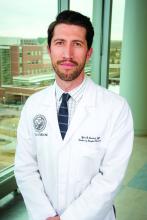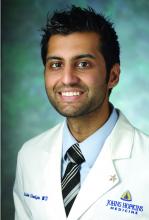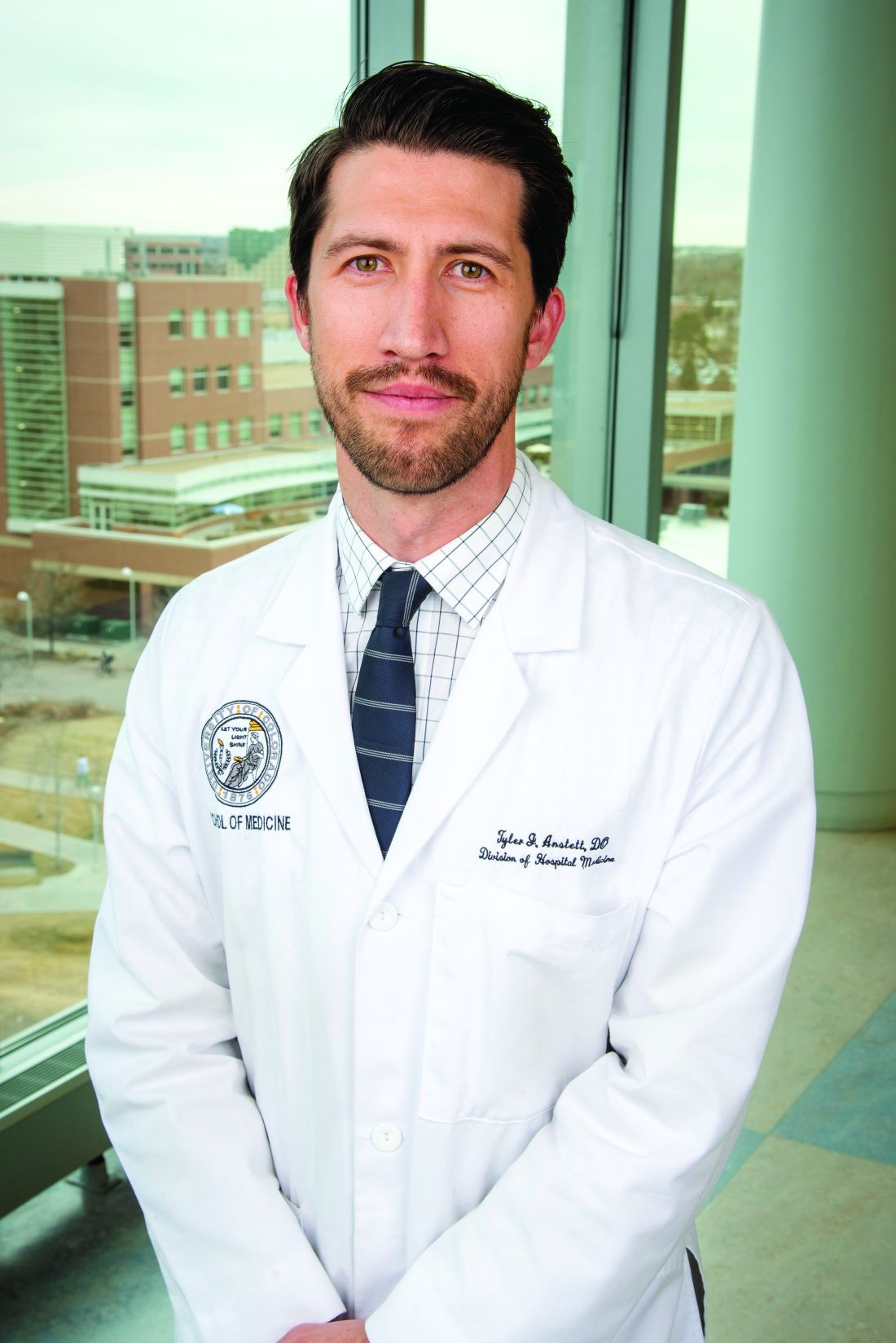User login
It is well established that lesbian, gay, bisexual, transgender, and queer (LGBTQ) patients suffer worse health outcomes, relative to patients who are heterosexual and cisgender – that is, those whose sense of personal identity and gender corresponds with their birth sex. The reasons for these disparities are multifactorial but include discrimination and limited provider knowledge about LGBTQ-specific health concerns.
These disparities – and what hospitalists can do to try to ameliorate them on the job – will be explored in a session at HM20 Virtual, “When the Answers Aren’t Straight Forward: Lesbian, Gay, Bisexual, Transgender, and Queer (LGBTQ) Health Updates for the Hospitalist.”
, according to Tyler Anstett, DO, copresenter and assistant professor in the division of hospital medicine at the University of Colorado. He and copresenter Keshav Khanijow, MD, an assistant professor in the division of hospital medicine, Northwestern University, Chicago, will share results from the Q-HEALTH (Quantifying Hospitalist Education and Awareness of LGBTQ Topics in Health) national survey of SHM members about their knowledge and attitudes regarding LGBTQ health. This survey, sponsored by SHM’s Education Committee, identified knowledge and comfort gaps in caring for LGBTQ+ patients. Most respondents say they are interested in receiving more didactic training on this topic, building on an introductory session on LGBTQ+ health presented at last year’s SHM Annual Conference. They also named the Annual Conference as one of their top venues for receiving such training.
The session at HM20 Virtual will cover the health disparities identified in LGBTQ+ populations, with case examples that highlight those disparities, Dr. Anstett said. “We will review results from Q-HEALTH, the SHM-wide survey on provider attitudes, knowledge, and comfort in caring for LGBTQ+ patients. Finally, the session will cover basic LGBTQ+ terminology and, through clinical scenarios, provide attendees with some basic skills for improving their practice for LGBTQ+ patients.”
With over 11 million Americans who identify as lesbian, gay, bisexual, transgender, and/or queer, hospitalists will certainly encounter patients of diverse sexual orientations and gender identities, Dr. Anstett said. Hospitalists should serve as allies for their patients, including for those who are LGBTQ+. Through this session, attendees can reflect on individual practice and learn how to educate others on LGBTQ+ health basics.
“We hope the cases we present will provide attendees with an introduction to the health issues the LGBTQ+ community faces with greater prevalence, and what hospitalists can be thinking about when they approach these issues,” Dr. Khanijow added.
Dr. Anstett and Dr. Khanijow had no relevant financial conflicts to disclose.
When the Answers Aren’t Straight Forward: Lesbian, Gay, Bisexual, Transgender, and Queer (LGBTQ) Health Updates for the Hospitalist
It is well established that lesbian, gay, bisexual, transgender, and queer (LGBTQ) patients suffer worse health outcomes, relative to patients who are heterosexual and cisgender – that is, those whose sense of personal identity and gender corresponds with their birth sex. The reasons for these disparities are multifactorial but include discrimination and limited provider knowledge about LGBTQ-specific health concerns.
These disparities – and what hospitalists can do to try to ameliorate them on the job – will be explored in a session at HM20 Virtual, “When the Answers Aren’t Straight Forward: Lesbian, Gay, Bisexual, Transgender, and Queer (LGBTQ) Health Updates for the Hospitalist.”
, according to Tyler Anstett, DO, copresenter and assistant professor in the division of hospital medicine at the University of Colorado. He and copresenter Keshav Khanijow, MD, an assistant professor in the division of hospital medicine, Northwestern University, Chicago, will share results from the Q-HEALTH (Quantifying Hospitalist Education and Awareness of LGBTQ Topics in Health) national survey of SHM members about their knowledge and attitudes regarding LGBTQ health. This survey, sponsored by SHM’s Education Committee, identified knowledge and comfort gaps in caring for LGBTQ+ patients. Most respondents say they are interested in receiving more didactic training on this topic, building on an introductory session on LGBTQ+ health presented at last year’s SHM Annual Conference. They also named the Annual Conference as one of their top venues for receiving such training.
The session at HM20 Virtual will cover the health disparities identified in LGBTQ+ populations, with case examples that highlight those disparities, Dr. Anstett said. “We will review results from Q-HEALTH, the SHM-wide survey on provider attitudes, knowledge, and comfort in caring for LGBTQ+ patients. Finally, the session will cover basic LGBTQ+ terminology and, through clinical scenarios, provide attendees with some basic skills for improving their practice for LGBTQ+ patients.”
With over 11 million Americans who identify as lesbian, gay, bisexual, transgender, and/or queer, hospitalists will certainly encounter patients of diverse sexual orientations and gender identities, Dr. Anstett said. Hospitalists should serve as allies for their patients, including for those who are LGBTQ+. Through this session, attendees can reflect on individual practice and learn how to educate others on LGBTQ+ health basics.
“We hope the cases we present will provide attendees with an introduction to the health issues the LGBTQ+ community faces with greater prevalence, and what hospitalists can be thinking about when they approach these issues,” Dr. Khanijow added.
Dr. Anstett and Dr. Khanijow had no relevant financial conflicts to disclose.
When the Answers Aren’t Straight Forward: Lesbian, Gay, Bisexual, Transgender, and Queer (LGBTQ) Health Updates for the Hospitalist
It is well established that lesbian, gay, bisexual, transgender, and queer (LGBTQ) patients suffer worse health outcomes, relative to patients who are heterosexual and cisgender – that is, those whose sense of personal identity and gender corresponds with their birth sex. The reasons for these disparities are multifactorial but include discrimination and limited provider knowledge about LGBTQ-specific health concerns.
These disparities – and what hospitalists can do to try to ameliorate them on the job – will be explored in a session at HM20 Virtual, “When the Answers Aren’t Straight Forward: Lesbian, Gay, Bisexual, Transgender, and Queer (LGBTQ) Health Updates for the Hospitalist.”
, according to Tyler Anstett, DO, copresenter and assistant professor in the division of hospital medicine at the University of Colorado. He and copresenter Keshav Khanijow, MD, an assistant professor in the division of hospital medicine, Northwestern University, Chicago, will share results from the Q-HEALTH (Quantifying Hospitalist Education and Awareness of LGBTQ Topics in Health) national survey of SHM members about their knowledge and attitudes regarding LGBTQ health. This survey, sponsored by SHM’s Education Committee, identified knowledge and comfort gaps in caring for LGBTQ+ patients. Most respondents say they are interested in receiving more didactic training on this topic, building on an introductory session on LGBTQ+ health presented at last year’s SHM Annual Conference. They also named the Annual Conference as one of their top venues for receiving such training.
The session at HM20 Virtual will cover the health disparities identified in LGBTQ+ populations, with case examples that highlight those disparities, Dr. Anstett said. “We will review results from Q-HEALTH, the SHM-wide survey on provider attitudes, knowledge, and comfort in caring for LGBTQ+ patients. Finally, the session will cover basic LGBTQ+ terminology and, through clinical scenarios, provide attendees with some basic skills for improving their practice for LGBTQ+ patients.”
With over 11 million Americans who identify as lesbian, gay, bisexual, transgender, and/or queer, hospitalists will certainly encounter patients of diverse sexual orientations and gender identities, Dr. Anstett said. Hospitalists should serve as allies for their patients, including for those who are LGBTQ+. Through this session, attendees can reflect on individual practice and learn how to educate others on LGBTQ+ health basics.
“We hope the cases we present will provide attendees with an introduction to the health issues the LGBTQ+ community faces with greater prevalence, and what hospitalists can be thinking about when they approach these issues,” Dr. Khanijow added.
Dr. Anstett and Dr. Khanijow had no relevant financial conflicts to disclose.
When the Answers Aren’t Straight Forward: Lesbian, Gay, Bisexual, Transgender, and Queer (LGBTQ) Health Updates for the Hospitalist


